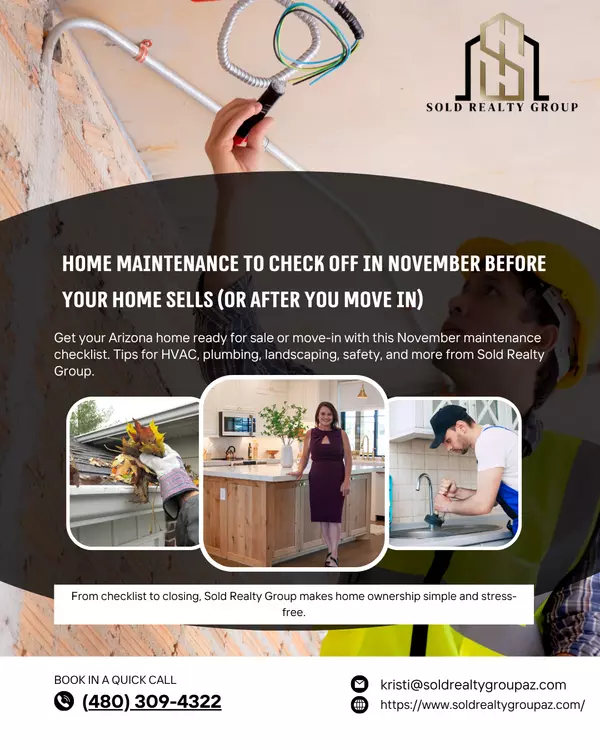How to Buy a Home When You’re Self-Employed: 2025 Edition

If you're self-employed—whether you're a freelancer, small business owner, contractor, or creative—congratulations! You’ve carved your own path and taken control of your income. But when it comes to buying a home, that non-traditional income can feel like a roadblock.
We’re here to tell you: You CAN buy a home when you're self-employed. It just takes strategy, preparation, and the right team—and that’s where Sold Realty Group comes in.
Here’s your complete 2025 guide to buying a home as a self-employed buyer:
🔍 1. Understand the Lender’s Perspective
Traditional home loans rely heavily on consistent, documentable income—something self-employed folks often have, but in a form that lenders don’t always know how to interpret.
Lenders want to see:
-
Stability: You’ve been in business for at least two years.
-
Profitability: Your income is steady or increasing year over year.
-
Low risk: Your credit score and debt load show financial responsibility.
The key is proving that your income is dependable—even if it fluctuates.
📁 2. Gather the Right Documentation
Self-employed buyers need to provide more paperwork up front. Here's what most lenders will ask for in 2025:
-
Last two years of personal tax returns
-
Last two years of business tax returns (if filed separately)
-
Year-to-date Profit & Loss (P&L) statement
-
Bank statements (both personal and business, usually last 2–3 months)
-
1099 forms or other income documentation
-
Business license or registration (if applicable)
-
CPA letter confirming income and business legitimacy (some lenders require this)
✅ Pro Tip: Avoid writing off too many business expenses. While they save you on taxes, they can also reduce your qualifying income on paper—something that can hurt you when applying for a mortgage.
📊 3. Monitor Your Debt-to-Income Ratio (DTI)
Your DTI ratio compares your monthly debts (like car loans, credit cards, student loans) to your gross monthly income. Even if you're earning well, high debt levels can impact your approval chances.
In 2025, lenders prefer a DTI below 43%.
To lower your DTI:
-
Pay off outstanding debt where possible
-
Delay large purchases (new car, equipment, etc.)
-
Increase savings to make a larger down payment
💳 4. Strengthen Your Credit Score
Your credit score remains one of the most important factors in your approval and interest rate. As of 2025:
-
A score of 740+ can unlock the best interest rates
-
Scores 620–679 may still qualify but likely with higher rates
-
Below 620? Consider boosting your score before applying
Ways to improve your score:
-
Pay all bills on time (especially credit cards)
-
Keep credit utilization under 30%
-
Don’t open or close credit accounts during the process
🔄 Credit tips take time—start working on this 3–6 months before you plan to buy.
🧾 5. Consider Alternative Loan Options
If traditional loans aren’t a fit, there are several flexible options for self-employed buyers in 2025:
-
Bank Statement Loans: Use 12–24 months of bank deposits as proof of income
-
No-Doc Loans: Limited documentation loans (often with higher down payments)
-
Asset-Based Loans: Qualification based on your savings/investments
-
DSCR Loans: For investors—approval is based on rental property income, not personal income
These non-traditional loan products aren’t for everyone, but in the right situations, they can open doors that standard loans won’t.
🤝 6. Work With a Lender Who Specializes in Self-Employed Buyers
Not all lenders understand self-employed income—and the wrong one can cost you time, money, and a lot of frustration.
Look for a lender who:
-
Regularly works with 1099 and business-owner clients
-
Can explain what documentation you’ll need (and why)
-
Has access to alternative loan programs if needed
-
Communicates clearly and quickly
At Sold Realty Group, we’ve built strong relationships with trusted local lenders who get it. We’ll connect you with the right financing partner to streamline your approval process.
🏡 7. Team Up With a Real Estate Agent Who Gets It
There’s a lot at stake when you’re self-employed and buying a home—and you need a real estate partner who understands how to:
-
Strategize your offer
-
Time the process with your financial timeline
-
Communicate clearly with your lender
-
Negotiate with your best interest in mind
That’s where we come in. At Sold Realty Group, we know how to guide independent buyers through the process—no cookie-cutter approach here. We advocate for you, answer every question, and make sure you’re not just buying a house, but investing in your future.
📌 Final Thoughts
Buying a home when you’re self-employed isn’t impossible—it just takes a little more homework. With the right documentation, strong credit, smart financial habits, and a team that understands the unique challenges of your situation, you can absolutely own your dream home.
You’ve built your business—now let’s build your future.
📍 Based in Mesa, AZ | Serving the East Valley & Beyond
📞 (480) 309-4322
🌐 soldrealtygroupaz.com
📧 [email protected]
Categories
- All Blogs (233)
- Arizona Real Estate & Local Market (18)
- Buying, Selling & Investing Tips (73)
- Home Improvement Ideas (40)
- HOME MAINTENACE TIPS (22)
- Home Selling Strategies (26)
- Legal & Financial Consideration (11)
- Listing (4)
- Living in Queen Creek (13)
- LIVING IN SANTAN VALLEY (10)
- Local Business Spotlight (1)
- Local Events & Activities (2)
- Question & Answers (1)
- Real Estate Education & Empowerment (8)
- Sold Selling Method: Perception (5)
- Sold Selling Method: Presentation (5)
- Sold Selling Method: Price (3)
- Staging (14)
- Sustainability and Green Living (4)
Recent Posts










GET MORE INFORMATION

